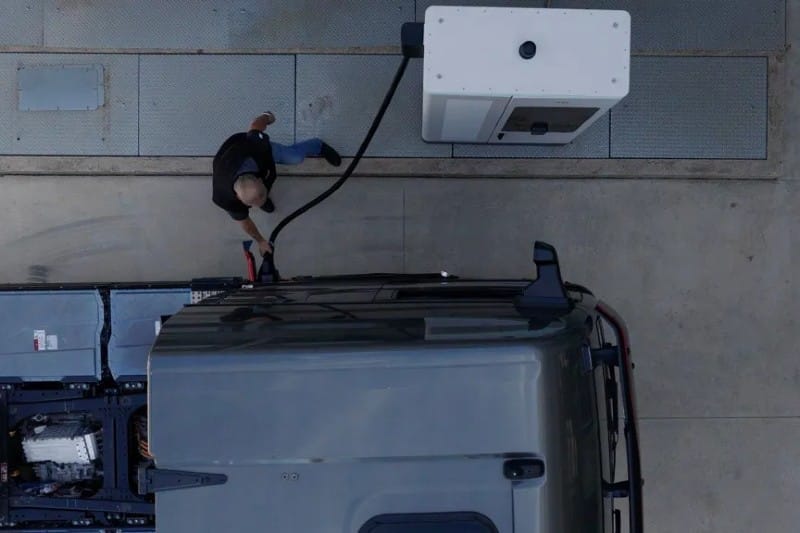MAN Truck & Bus and ABB E-mobility have been working together on MCS charging tests for some time. Both sides signed a cooperation agreement at the beginning of 2024. Now the duo has new test results to share. Over a period of three days, the partners tested system and device communication and Transport Layer Security (TLS), measured power and current ripple, and ran through scenarios for terminating charging processes and emergency shutdowns.
“Each of these categories is essential to ensure the interoperability, reliability, and safety of future charging sessions between truck and charging infrastructure,” ABB emphasises in a statement. The partners report that the highlight of the test days was the aforementioned charging window of just 36 minutes for charging a 480 kWh truck battery from 2 to 90 per cent. Furthermore, support for a longer charging session with a constant 1,000 amps (at a peak power of 740 kW) was successful. And: emergency tests demonstrated that the current drops from 1,000 to zero amps in less than 3 milliseconds.
Uninterrupted charging is also one of the duo’s goals. That is why MAN and ABB carried out a three-and-a-half-hour MCS charging process to test the stability of the MCS platform. This long high-current charging process took place ‘without interruption’, as it is called, with the PIN temperature never exceeding 55 degrees Celsius and thus remaining well below the standard limit of 90 degrees Celsius.
Christopher Thompson, Head of Product and Portfolio Marketing at ABB E-mobility, is very satisfied with the results. “As we move toward a larger scale deployment of electric trucks, these tests are not just about validation,” he emphasised. “They are about building trust: trust that a truck will charge efficiently, safely and without losing time: In our test, the MAN truck charged from 2% to 90% state of charge in just 36 minutes at nearly 750 kW – exactly what fleets will need on the road.”
Marcel Hessel, responsible for charging systems and components at MAN Truck & Bus, added: “For our customers, downtime is not an option. That test proved that MCS technology is ready to deliver the performance needed – and also meet our shared commitment to highest safety standards.”
Just this spring, MAN and ABB announced that they had tested megawatt charging with Ethernet-based communication for the first time, as is planned for MCS charging in the future. Previous charging tests and trials in the megawatt range have often been based on the communication methods used for CCS charging. Ethernet-based communication is regulated by the ISO 15118-20 standard and the recently published ISO 15118-10. Both standards define the communication protocol used for MCS charging. The tests were carried out at MAN in Munich using a proof-of-concept charging station, a pre-production device based on ABB’s Terra platform.
The duo had previously demonstrated megawatt charging publicly for the first time in March 2024. A MAN eTruck was charged at a prototype charging station from ABB with 700 kilowatts and 1,000 amps – albeit still using CCS communication. At the time, the commercial vehicle manufacturer stated that the battery charging time, from 10 to 80 per cent, was “around half an hour.” The Swiss charging specialists are also working with manufacturer Scania, which, like MAN, belongs to the Traton Group, on MCS charging. The aim of the cooperation is to avoid problems for the first users of MCS-enabled trucks. Against this background, the software and interoperability tests with vehicles and charging stations are intended to identify and rectify potential errors so that a reliable infrastructure is available at an early stage.
The Megawatt Charging System is designed for a charging voltage of up to 1,250 volts and a current of up to 3,000 amps. This theoretically corresponds to a charging capacity of up to 3.75 megawatts. And unlike electric cars, the position of the charging port on MCS vehicles is standardised. The charging port is located on the left side of the vehicle, between two and 4.80 metres behind the bumper. It should be approximately at hip height. This uniform position is intended to simplify the construction of charging parks.
ABB E-mobility and MAN have now demonstrated 700 to 750 kW charging power on several occasions. “With the finalisation of the MCS standard, charging capacities of over one megawatt will already be possible,” MAN headquarters recently announced. As far as interoperability tests are concerned, both sides say they have already validated long-term charging sessions with continuous 1.2 MW power at the MAN plant in Munich.
The international standardisation process for the Megawatt Charging System is expected to be completed shortly. ABB E-mobility and MAN are participating in this process through the international industry association CharIN.
e-mobility.abb.com
This article was first published by Cora Werwitzke for Ev Authority’s German edition.


